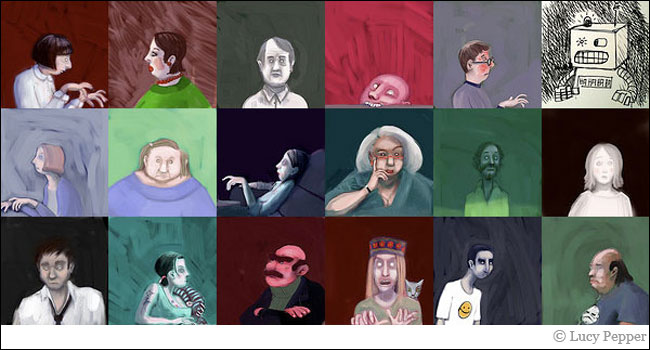The ongoing debate over anonymous comments on newspaper websites
There was another fascinating round of the debate about anonymous and pseudo-anonymous comments on newspaper websites this morning, which seemed to be kicked off primarily by Times columnist David Aaronovitch on Twitter:
“Can anyone think of a reason why commenters on newspaper sites should be allowed to be anonymous, or use pseudonyms? I find the CiF comments system completely pointless, partly because of ano/pseudo-nymity. Same tedious trashers endlessly recycled.”
He later asked for some evidence of anonymous comments being useful. I pointed to an example that I give in my presentations about how digital communications have changed media companies, where the Guardian published some powerful first person testimony about being a rape victim that I don’t think you would get if you had insisted she publish using their Facebook identity. Rhodri Marsden chipped in to say he had interviewed the person in question, and that they very much valued their pseudonymity.
Gia Milinovich joined in as well, pointing to this excellent blog post of hers from a couple of years back: “I have rights”.
There is a contrast though, with the fact that busy journalistic people like David, Rhodri, Paul Waugh and Gia joined in the conversation with me this morning - primarily under my pseudonym @currybet - in a way that, as a rule, journalists generally don’t in newspaper website comment threads. The view expressed by Frank Swain is one that would no doubt find a lot of sympathy amongst journalists:
“It’s ironic that articles I write go though several subs and editors to get published, just so others can append unmoderated shite”
It doesn’t surprise me. I was recently asked after a talk “Should journalists always read the comments underneath their articles?”. My answer has to frustratingly be that I think yes of course. And no.
Personally I can’t ever imagine publishing something on the web and not looking to see what conversation or comments developed, but then I’ve been on the web for a long time and so abuse kind of passes me by - in fact the last comment I approved on this blog started “This is a load of pony”.
Traditionally though, journalists and reporters haven’t had such direct and contrary feedback to their articles as they often get online - the worst you used to get was an editor criticising you, and maybe a letter in the paper a couple of days after your piece was published. I can see why that is an uncomfortable place to be now.
One of the real problems that besets community interaction on news is that, as my colleague Meg Pickard observes, really good communities grow around niches of common interest. Unfortunately comments underneath news articles attract a niche of people who tend to be either angry about the news that is being reported, or angry about the way a particular piece of news they care about is being reported.
Nevertheless you can build really rewarding and excellent niche communities on a news website - Readers Recommend on ours is a great example. And I can’t praise highly enough the work of our community co-ordinators at The Guardian. You wouldn’t dream of starting up a website where you wanted an audience to engage and participate without having someone to shape, encourage and oversee that activity. Community management is a vital role, and I genuinely have no idea why so many news organisations think they can do without it, and still generate “good community interaction”.
Technology has a role to play, although like Adam Tinworth I’m wary of the move to “ship all the difficult stuff over to Facebook” without addressing the fundamental behaviours of a community. Certainly, this year one of my main goals is to help our online community tools develop in a way that improves the quality of conversation and gently turns down the volume control on the voices of the idiots.
It isn’t just about technology though, it is about the behaviour of people. If you invite people into your house, then pay no attention to them, it can’t be much of a surprise if they start bad-mouthing you. And if you write provocative pieces, you have to expect people to be provoked.
But there is a least one positive thing about trolls - as Andrea Jezovit put it on The New News blog this week: “Trolls really aren’t so bad once you realise they all fit into Lucy Pepper’s Troll Catalogue”. I think I’d prefer to be the blinky-eyed robot one on the top right.

Thumbnails of Lucy Pepper's Troll Catalogue
“currybetdotnet: Best of the blog 2011” brings together over 50 of the best posts on this blog from 2011, covering topics such as live blogging, community and social media for news websites, and the future of digital media. It features write-ups of talks by Guardian journalists including Paul Lewis, Matthew Wells, Andrew Sparrow and Chris Elliot, and behind the scenes looks at Guardian products like the Facebook and iPad apps. It also has transcripts of Martin Belam's talks at EuroIA, the UPA conference, Polish IA Summit, Content Strategy Forum 2011, FutureEverything and Hacks/Hackers London.
“currybetdotnet: Best of the blog 2011” for Kindle is £1.92.

There must be regular newspaper letter writers who used pseudonyms, surely?
One of the points made to Aaronovitch was that newspaper leading editorials are always anonymous, although he countered that since the editor was usually well known, that didn't matter these days. That wasn't always the case though, and I think the anonymity of the leader was a legal protection thing in the early days.
Crossword setters use obtuse pseudonyms in papers though, don't they?
I'm skeptical that anonymity is really the problem. Do the commenters think they are being unhelpful/aggressive/boringly partisan or witty/plain-speaking/informed? If the latter, will real names help?